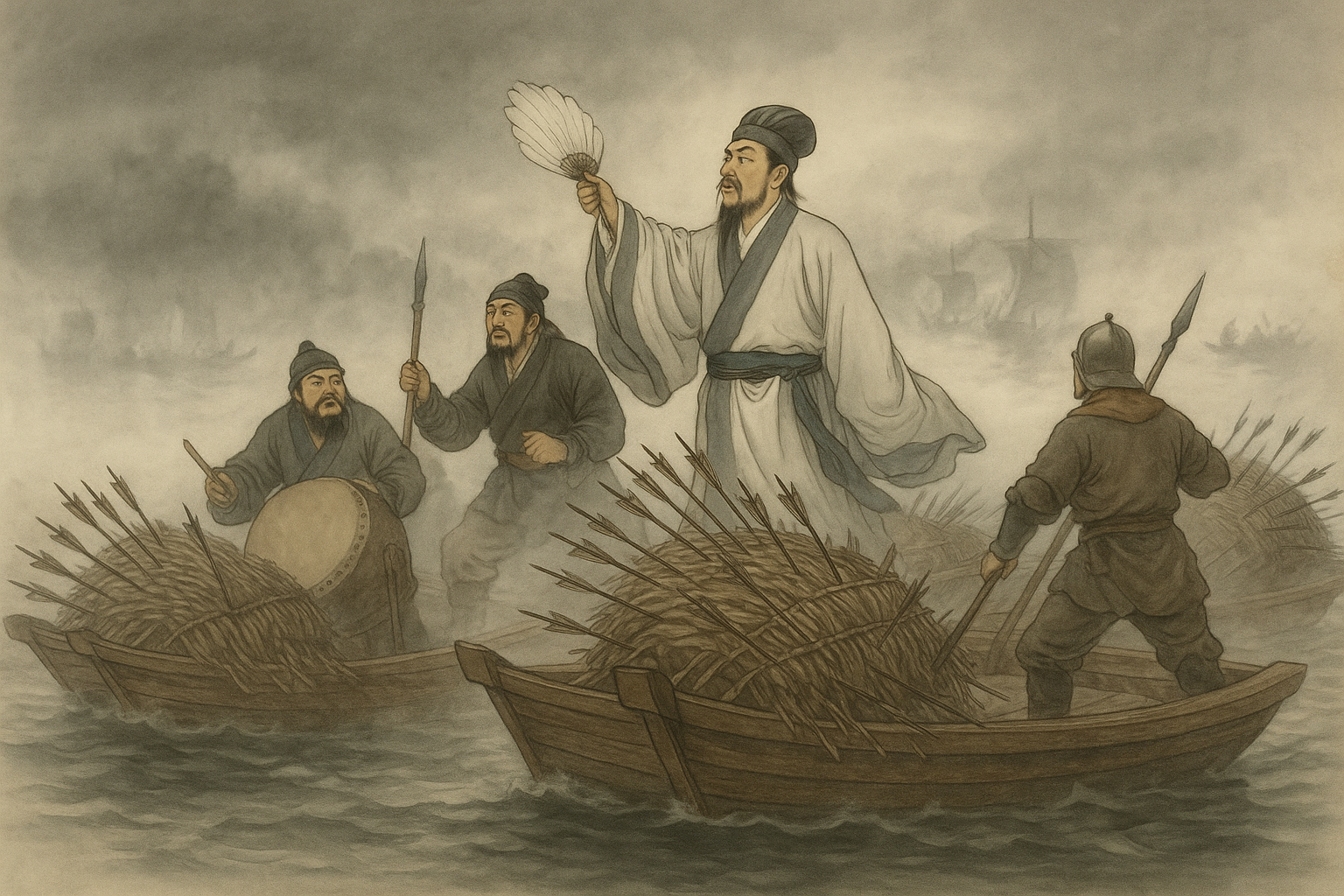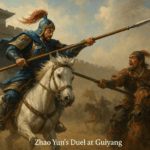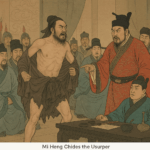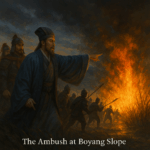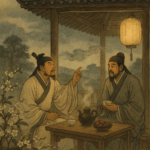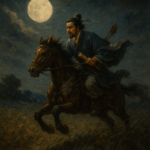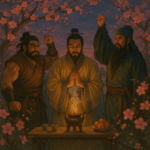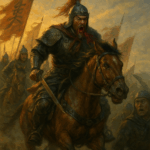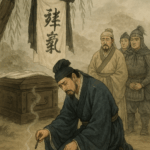Lu Su, having heard Zhou Yu’s instructions, went straight to the boat to confer with Zhuge Liang. Zhuge Liang welcomed him into his small skiff, and they sat facing each other. Lu Su said, “Over the past few days, in handling military affairs, I have neglected to ask your advice.” Zhuge Liang replied, “Even I, Liang, have not yet congratulated the Commander.” Lu Su asked, “What is there to congratulate?” Zhuge Liang said, “When General Zhou Yu sent you to test my awareness, this very scheme was worth celebrating.” At these words, Lu Su’s expression changed, and he asked, “How do you know what this scheme is?” Zhuge Liang said, “This stratagem can only be used to deceive Jiang Gan. Even if it fools Cao Cao once, he will immediately see through it—he simply won’t admit his mistake. Now that Cai Mao and Zhang Yun are dead, Eastern Wu has no worries ahead. How could that not be a cause for celebration? I have heard that Cao Cao replaced Mao Jie and Yu Jin as naval commanders; those two men will surely cost him the lives of many sailors.” Hearing this, Lu Su was struck dumb, fumbling for words. After a long moment he took his leave. Zhuge Liang cautioned him, “Do not reveal to General Zhou Yu that I anticipated this scheme. If he suspects I was jealous, he will look for a pretext to harm me.”
Lu Su went back to report exactly what Zhuge Liang had said. Zhou Yu was astonished: “This man absolutely cannot stay! I have decided to execute him!” Lu Su counseled, “If you kill Zhuge Liang, Cao Cao will laugh at us.” Zhou Yu said, “I will see to it that he dies without feeling wronged.” Lu Su asked, “How will you justify such a lawful execution?” Zhou Yu said, “Do not ask—come see for yourself tomorrow.” The next day, he summoned all the generals to the tent and asked them to bring Zhuge Liang so they could discuss affairs of war. Zhuge Liang came cheerfully. Once seated, Zhou Yu asked, “We will clash with Cao Cao’s forces today in a naval battle. Which weapon should take precedence?” Zhuge Liang said, “On the broad river, the foremost weapon is the bow and arrow.” Zhou Yu said, “Your words align exactly with my own. However, our army is short on arrows. I must ask you, sir, to supervise the manufacture of a hundred thousand arrows to arm us. This is a matter of state—please do not decline.” Zhuge Liang said, “Since the Commander entrusts me, I will gladly serve. May I ask by when you need the hundred thousand arrows?” Zhou Yu said, “Within ten days—is that feasible?” Zhuge Liang said, “Cao Cao’s army arrives today; if we wait ten days, we will lose everything.” Zhou Yu asked, “Then how many days do you think it will take?” Zhuge Liang said, “Only three days; by then I will present one hundred thousand arrows.” Zhou Yu said, “There are no idle promises in my army.” Zhuge Liang said, “How dare I jest with the Commander? I pledge under the army’s seal: should I fail in three days, punish me harshly.” Zhou Yu laughed with delight, summoned the military secretary to draw up the written pledge in their presence, and then hosted a celebratory feast: “When the task is complete, you will be rewarded.” Zhuge Liang said, “There is no time to wait until tonight; I shall begin tomorrow and by the third day have the arrows. On that day, send five hundred men to the riverbank to gather the arrows.” They drank several cups, and Zhuge Liang took his leave.
Lu Su said, “Could this man be deceiving us?” Zhou Yu said, “He is walking to his own death, not because I chase him but because he walked himself into it. Now that he has sworn to deliver writing, even if he sprouted wings, he cannot fly away. I have told the military craftsmen to delay him—whenever he needs supplies, do not provide them. In this way, he will certainly fail the deadline. Then I can punish him justly. Go now to learn whether his scheme has any substance; return and report back.”
Lu Su accepted this order and went to see Zhuge Liang. Zhuge Liang said, “I warned the Commander that he would harm me if he suspected my foresight. But Lu Su did not hide my words; as expected, this trouble has arisen. How can I possibly produce a hundred thousand arrows in three days? Only Lu Su can save me now.” Lu Su said, “You have brought this trouble upon yourself; how could I save you?” Zhuge Liang said, “I ask only that General Lu Su lend me twenty boats, each with thirty soldiers aboard. Cover each vessel with a blue cloth canopy and strew about a thousand bundles of reeds on each side. I have a special use for them. By the third day, I guarantee I will have one hundred thousand arrows. But do not let Zhou Yu learn, for if he does, my plan will fail.” Lu Su agreed, though he did not fully understand, and hurried back to report to Zhou Yu—he stated that Zhuge Liang would need none of the usual materials like arrow shafts, fletching, or lacquer; he had his own reasoning. Zhou Yu grew very suspicious: “We shall see how he answers on the third day!”
Meanwhile, Lu Su secretly prepared twenty swift vessels, each carrying more than thirty men, and equipped them with blue canopies and bundles of reeds exactly as Zhuge Liang specified, ready for him to use. On the first day, Zhuge Liang made no move; on the second day, he still sat idle. At the fourth watch of the third day, Zhuge Liang secretly summoned Lu Su aboard one of the boats. Lu Su asked, “Why have you summoned me?” Zhuge Liang said, “I need us both to go fetch the arrows.” Lu Su asked, “Where are we going?” Zhuge Liang said, “Do not ask; you will see when we arrive.” He then ordered the twenty boats to be tied to one another in a line and steered toward the northern shore. That night, a dense fog blanketed the Great River, so thick that the opposite bank could not be seen. Zhuge Liang urged the boats forward, and indeed, the fog was exceedingly heavy. A famous ode once described such a scene:
Great indeed is the Yangtze! To the west it abuts the Min Mountains; in the south it holds sway over the lands of the Three Wus; to the north it meets the Nine Rivers. It gathers a hundred streams to pour into the sea, sending its waves far across the ages. In deep mists, mythical beasts like the Dragon Earl and the Sea Lord, water nymphs and vast whales, all gather there. Ghosts and spirits and extraordinary monsters find their haunt there; heroes meet in battle to stake their claim. When yin and yang are confused and dawn cannot be distinguished, the sky becomes one gray haze, and a great fog gathers on all sides. Even a fire-lit carriage cannot be seen—only the drumbeats can be heard. At first, it is like mist over the Southern Hills; gradually it grows dense, as if to swallow up the Northern Sea. It reaches high to touch the sky and thickly carpets the earth; vast and boundless it overwhelms the senses. Whales rise in waves; flood dragons dive and exhale their breath. A chill mist, born of spring’s murky rains, brings sudden frost. In the great expanse, no trace of land remains—towns vanish from sight; warships cannot find their moorings and vanish into ravines; a lone fishing skiff drifts, lost in the tumbling waves. The sky and water merge, and even the sun’s brilliance is dimmed; the day’s light turns to a hazy dusk; the mountains take on an aqua hue. Even the brilliance of sage kings cannot discern depth here, nor can the keen eye of a sage measure the width. Only when the tides pause and the winds die do miseries recede; fish and turtles hide, birds and beasts slip away. Isles of myth disappear, and palaces grow dark and silent. The coursing waves thus come like a sudden storm; the drifting mist gathers like winter clouds. Beneath it lurk venomous snakes and foul miasmas; within it dwell evil spirits and dreadful traps. It brings disease to all in its path and stirs dust storms beyond the frontier. Peasants fall dying; nobles and scholars watch in dismay. So the primal forces return to the ancient void, and Heaven and Earth melt together into one formless whole.
At the fifth watch that night, the boats reached Cao Cao’s river camp. Zhuge Liang ordered the vessels to line up with their bows to the west and sterns to the east, forming a long row, and on each boat drums began to toll and war horns blared. Lu Su cried out, “If Cao Cao’s troops emerge together, how shall we prevail?” Zhuge Liang laughed: “I predict that in this thick fog, Cao Cao will not dare to send out his men. Meanwhile, we shall drink and enjoy ourselves; when the fog lifts, we will return.”
Back in Cao Cao’s camp, commanders Mao Jie and Yu Jin heard the beating of drums and the shouts of war horns. They hastily reported to Cao Cao. Cao Cao issued orders: “The heavy fog disguises them—when an enemy emerges, there must be an ambush. Do not move recklessly; deploy your naval archers to rain arrows upon them.” He also dispatched messengers to the land camp to summon Zhang Liao and Xu Huang, ordering each to bring three thousand bowmen to the riverbank with all speed. By the time the orders arrived, Mao Jie and Yu Jin—fearing the southern fleet would breach their defenses—had already posted bowmen before the camp, and soon the land camp archers arrived, over ten thousand strong, raining arrows upon the boats like a storm. Zhuge Liang commanded his boats to turn, bows facing east and sterns facing west, and move close to the enemy’s encampment, accepting the arrows as they beat the drums and cried out. As dawn broke and the fog finally dissipated, Zhuge Liang ordered a swift retreat. On each of the twenty boats, the reeds of mischievous shape were now bristling with arrows—truly over a hundred thousand. By the time the news reached Cao Cao’s camp, Zhuge Liang’s fleet had already sped more than twenty li downstream, disappearing out of reach. Cao Cao lamented bitterly.
Meanwhile, Zhuge Liang returned in his skiff to meet Lu Su and said, “On each boat there are about five or six thousand arrows. Without using a single bolt of Eastern Wu’s arrow cloth, we have gained over a hundred thousand arrows. Tomorrow we can freely rain them upon Cao Cao’s forces—how fortunate!” Lu Su said, “Sir, you are truly a divine being! How did you foresee such a heavy fog today?” Zhuge Liang said, “A commander who does not study the heavens and skies or labor to understand terrain, who lacks knowledge of the propitious and inauspicious, does not grasp the oscillations of yin and yang, disregards battle formations, and is ignorant of military forces, is no more than an ordinary man. Three days ago, I already calculated that there would be a great fog today—thus I dared to accept the three-day deadline. General Zhou Yu ordered me to finish in ten days; I asked for materials but they were withheld. This was his attempt to slip me a death sentence. But my life is determined by Heaven; how could Zhou Yu kill me?” Lu Su knelt in admiration.
When their boats landed, Zhou Yu had already stationed five hundred men on the riverbank to receive the arrows. Zhuge Liang ordered the boatmen to unload them all, yielding over one hundred thousand arrows, which they delivered to the central command tent. Lu Su returned to inform Zhou Yu of Zhuge Liang’s stratagem to gather the arrows. Zhou Yu was astonished and sighed, “Zhuge Liang’s divine calculations exceed mine!” Later generations composed these praises:
A dense fog filled the Yangtze today, obscuring banks far and near.
Like sudden rain of locusts upon warships, Zhuge Liang ambushed Zhou Yu today.
After a short while, Zhuge Liang went into the camp to see Zhou Yu. Zhou Yu rose from his couch to greet him, exclaiming, “Sir, your uncanny foresight commands our respect.” Zhuge Liang said, “This trick is but a small matter—nothing extraordinary.” Zhou Yu invited Zhuge Liang into his tent for a drink. Zhou Yu said, “Yesterday my lord sent an envoy urging us to hasten our march. I have no remarkable strategy—please teach me.” Zhuge Liang said, “I am of humble ability; how could I have any great schemes?” Zhou Yu said, “Last night I surveyed Cao Cao’s river camp—it is exceedingly well-organized and not easily attacked. I have an idea—would you judge its merits?” Zhuge Liang said, “General, do not speak of it aloud. Each of us should write a single character on our palms; only then can we know if our thoughts align.” Zhou Yu was delighted, had pen and ink brought, and secretly wrote on his palm. He then slid his hand close to Zhuge Liang’s. Zhuge Liang likewise secretly wrote on his palm. Both showed their hands at once, laughing heartily: each had inscribed the character “fire.” Zhou Yu said, “Since we are of one mind, there is no doubt. Be careful not to leak this to anyone.” Zhuge Liang said, “Matters of state will naturally be kept secret. Though this is the second time I have used this trick on Cao Cao, he will not anticipate it again. Now, Commander, do as you will.” They finished their drink, and all the generals, unaware of what had transpired, dispersed.
As for Cao Cao, he had lost fifteen or sixteen ten-thousand arrows for nothing and brooded in frustration. Xun You proposed, “Eastern Wu’s Zhou Yu and Zhuge Liang are too cunning to overcome by force. We should send envoys feigning surrender to serve as internal spies to gather information—then we might find a way to succeed.” Cao Cao said, “That is exactly what I have in mind. Who in our army would be suitable to undertake such a ruse?” Xun You said, “Cai Mao was executed, but the rest of the Cai clan remains in our service. Cai Mao’s younger cousins, Cai Zhong and Cai He, now serve as vice-commanders. The Chancellor could treat them kindly and send them to feign surrender in Eastern Wu; they will not be suspected.” Cao Cao agreed and that very night secretly summoned them to his tent. He instructed, “You two shall gather a small detachment of soldiers and sail to Eastern Wu to feign surrender. If there is any movement, send word at once. When all is accomplished, you will be richly rewarded. Do not entertain any divided loyalties!” Cai Zhong and Cai He said, “Our families remain in Jingzhou; how could we harbor divided loyalties? Chancellor, you need not worry. We will seize the heads of Zhou Yu and Zhuge Liang to present to you.” Cao Cao bestowed great rewards upon them. The next day, they took five hundred soldiers and boarded several vessels, sailing south with the prevailing wind.
In Eastern Wu, Zhou Yu was holding a council on the advance when a report arrived: “There are boats at the river’s mouth bearing Cai Zhong and Cai He, saying they come to surrender.” Zhou Yu summoned them. The two cousins knelt in tears: “Our brother was innocent—he was killed by Cao Cao’s traitorous order. We come to avenge him by serving you. Please accept us so we may lead your vanguard.” Zhou Yu was overjoyed, granted them rich rewards, and assigned Gan Ning to lead the vanguard alongside them. But secretly, he thought, “These two come without their families—surely they are Cao Cao’s spies. I shall use their cunning against them: let them send word, and when our forces march, we will first kill these two and raise the banner over their heads. Gan Ning, be alert!” He instructed Gan Ning accordingly and sent him off.
Not long after, Lu Su entered to see Zhou Yu. Lu Su said, “The surrender of Cai Zhong and Cai He is surely feigned—they must not be trusted or accepted.” Zhou Yu angrily shouted, “They have come to avenge their brother’s unjust death at Cao Cao’s hands—how can that be a false surrender? If you doubt them so much, how can you accommodate the men of the realm?” Lu Su fell silent and withdrew, then went to tell Zhuge Liang what had happened. Zhuge Liang laughed but said nothing. Lu Su asked, “Sir, why do you laugh?” Zhuge Liang said, “I laugh because Lu Su does not see that Zhou Yu’s beatings of Huang Gai were part of his stratagem. Huang Gai will be sent to feign surrender, and Cao Cao’s two agents, Cai Zhong and Cai He, will dutifully report it. Commander Zhou is using their deception against Cao Cao—that is the art of war.” Lu Su finally understood.
That night in his tent, Zhou Yu was seated when Huang Gai quietly slipped in. Zhou Yu asked, “Gongfu, you come at night—surely you have a brilliant plan?” Huang Gai said, “Their troops far outnumber ours; we cannot sustain the conflict for long. Why not use a fire attack?” Zhou Yu said, “Who taught you to propose this idea?” Huang Gai said, “It is my own suggestion, not from anyone else.” Zhou Yu said, “I already intended as much; that is why I set Cai Zhong and Cai He to feign surrender and relay our intentions. But I lacked one person to carry out the ruse.” Huang Gai said, “I volunteer to undertake the bitter-meat ruse.” Zhou Yu said, “If you do not endure some hardship, how will they ever believe you?” Huang Gai said, “Having enjoyed the Sun family’s favor for three generations, even if they butcher me limb from limb, I will have no regrets.” Zhou Yu knelt and thanked him: “If you will undertake this bitter-meat ruse, you are the greatest blessing of Eastern Wu.” Huang Gai said, “I shall die without complaint.” With that, he took his leave.
The next day, Zhou Yu beat the war drums and convened all the generals in the tent, with Zhuge Liang present as well. Zhou Yu said, “Cao Cao has marshaled a million troops and extended his lines over three hundred li; he cannot be defeated at a single stroke. Now I order each general to gather three months’ worth of provisions to prepare for the enemy’s assault.” Before he finished speaking, Huang Gai stepped forward and said, “Even three months will not suffice—and even thirty months of provisions cannot last twice our needed time! If we are to succeed this month, we will; if not, then, as Zhang Zibu advises, all we can do is cast down our arms, turn northward, and surrender!” Zhou Yu’s face darkened with fury. He cried, “I serve under His Majesty’s command to destroy Cao Cao. If anyone speaks again of surrender, I shall execute him—and tearing at our soldiers’ hearts, How dare you utter such words at a time of war? If I do not cut off your head, how can I hold the rest in line? Seize him!” The guards dragged Huang Gai forward. He, too, was furious: “I have served beneath the General who defeats the barbarians and roams the Southeast for three generations—how dare you challenge me?” Zhou Yu, in his rage, ordered him to be executed: “Gan Ning, see to it immediately!” Gan Ning stepped forward, but then interceded: “General, Gongfu is an old minister of Eastern Wu—please spare him.” Zhou Yu roared, “How dare you speak out of turn? You defy orders!” and had Gan Ning beaten and thrown out. The other officers knelt and begged, “Huang Gai’s crime merits execution, but that would harm military morale. We entreat the Commander’s mercy—suspend his sentence for now, and if we do not secure victory over Cao Cao, then execute him afterward.” Zhou Yu’s anger still raged. He said, “Were I to ignore your pleas, I would show no mercy! However, for now I pardon him.” He instructed the guards, “Drag him out and give him a hundred strokes of the cane, to set an example for all!” The officers pleaded again, and Zhou Yu slammed the table, shouting, “Stand back!” He ordered the corporal punishment: stripped of his clothes, Huang Gai was bent to the ground and given fifty strokes of the cane. Even as he lay bleeding, the officers continued to beg for mercy. Zhou Yu leapt to his feet, pointing at Huang Gai: “How dare you mock me? Another offense and you shall receive fifty more! Do you understand?” Then, filled with wrath, he returned to his tent.
The officers helped Huang Gai to his feet—his skin cracked and blood streaming down—and carried him back to his own quarters, where he fainted several times. Everyone who came to inquire wept bitterly. Lu Su also went to ask after him and then crossed to Zhuge Liang’s skiff. He said to Zhuge Liang, “Why did you stand idly by today while Zhou Yu mercilessly beat Huang Gai? We are all subordinate commanders and dare not openly remonstrate, but you are merely a guest—why did you not speak?” Zhuge Liang laughed and said, “Lu Su, you have deceived me.” Lu Su said, “Since crossing the river with you, I have never deceived you—why speak thus?” Zhuge Liang said, “Does Li Su not know that Zhou Yu’s brutal beating of Huang Gai was itself part of his stratagem? If Huang Gai did not endure that, he could never fool Cao Cao. Now Huang Gai must be sent to feign surrender, with Cai Zhong and Cai He reporting our movements. When you meet General Zhou, do not say that I foresaw this; only say that I, too, resented the Commander’s actions.” Lu Su finally realized.
Lu Su then visited Zhou Yu. Zhou Yu invited him into his tent. Lu Su said, “Why did you flog Huang Gai today?” Zhou Yu said, “Do the generals resent it?” Lu Su said, “Many do feel uneasy in their hearts.” Zhou Yu said, “What does Zhuge Liang think?” Lu Su said, “He, too, resents the Commander’s harshness.” Zhou Yu laughed and said, “We must deceive him in this matter.” Lu Su asked, “How so?” Zhou Yu said, “This harsh beating of Huang Gai is itself a ruse. I shall send Huang Gai to feign surrender—first we must fool Cao Cao, then employ the fire attack. Only thus can we win.” Lu Su pondered Zhuge Liang’s profound insight but dared not speak plainly.
That night, Huang Gai lay in his quarters, and the generals came to check on him. He said nothing, but sighed deeply. Suddenly, Kan Ze arrived to inquire. He was ushered into the tent and the guards dismissed. Kan Ze said, “General, have you some grievance against Commander Zhou?” Huang Gai said, “Not at all.” Kan Ze said, “Then surely your punishment today was the bitter-meat ruse?” Huang Gai said, “How do you know?” Kan Ze said, “I watched Commander Zhou’s every move and guessed it was so.” Huang Gai said, “I have received three generations of generous favor from the Sun family and could not repay it otherwise. I offered this plan to destroy Cao Cao. Though I suffer, I have no regrets. I surveyed our camp and found no trusted confidants, but you, Sir, have a heart of loyalty and righteousness—thus I confide in you.” Kan Ze said, “What you are telling me is simply to have me deliver a false surrender letter.” Huang Gai said, “Indeed that is my intent. Will you do it?” Kan Ze eagerly agreed. Truly:
A valiant general sacrifices his life to serve his lord; a loyal minister shares his heart for the state.
What bold words did Kan Ze speak next? We shall see in the following chapter.
